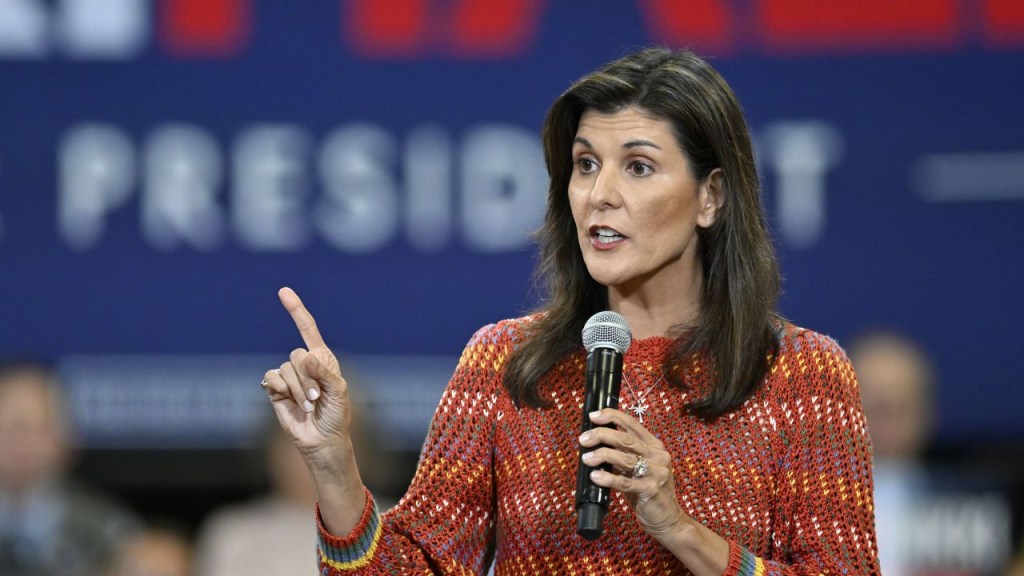Trump-DeSantis fight intensifies heading into election 2:26
(CNN) -- Do you know who is third in the polls of the Republican race for president in 2024? It may seem like an odd question given that the top two candidates, former President Donald Trump and Florida Gov. Ron DeSantis, are the only ones averaging more than 5% nationally.
The answer, however, is former Vice President Mike Pence and former Ambassador to the United Nations Nikki Haley, both tied at just 4%.
- Republican Nikki Haley announces her bid for the White House by 2024
More troubling for Haley, who will participate in a CNN forum Sunday night, and for other candidates who are not in the top two, is the apparent nationalization of the GOP primary process this year. We see this reflected in state polls, including early voting and those in the home states of declared candidates: all largely show a significant advantage for Trump.
Presidential primaries, unlike general elections, are not held on the same day. They are sequential, and the states that vote first take on inordinate importance. This is why Republican candidates are flocking to Iowa (for their caucuses) and New Hampshire (for the nation's first primaries).
In recent years, national poll leaders at this point in the primary season who would later lose their party appointments did so in part because they lost the Iowa caucuses. That happened to the two candidates with the largest national advantage: Republican Rudy Giuliani and Democrat Hillary Clinton, in 2008.
advertising
Both were clearly struggling in Iowa at that point in the cycle. In fact, neither topped the May 2007 Des Moines Register polls.
The contest towards 2024 is nationalized
This year, we don't see that much of a disconnect between national polls and those in early states, at least for now. The top two candidates in the Iowa and New Hampshire polls are Trump and DeSantis. A University of New Hampshire poll conducted in mid-April, for example, gave Trump 42% and DeSantis 22%. New Hampshire Gov. Chris Sununu, who is expected to announce his plans for 2024 this week, was in third place with 12%.
Let's focus on the Sununu data. A few years ago, I pointed out that one of the best ways to predict whether a candidate who trails in national and early-state polls might surprise people is by examining how they were doing in their home states.
At this point in the 2016 cycle, Senator Bernie Sanders was already leading the Vermont Democratic primary, despite Hillary Clinton's considerable national lead. On the other hand, former Maryland Gov. Martin O'Malley's lack of polling strength in his home state made me rule him out as a candidate.
Polls in his home state are a crucial early indicator of a candidate's strength. There, voters know the candidates best. If you can't stand out where voters already know you, how are you going to do it in states where voters are starting to know you?
Sununu doesn't need to worry about his name recognition in Granite State. The same is true of Haley in South Carolina, where she was governor. South Carolina is also the third state on the GOP candidate calendar for 2024, after Iowa and New Hampshire.
Former South Carolina Gov. Nikki Haley speaks at a rally in Greer on May 4, 2023. (Credit: Peter Zay/Anadolu Agency/Getty Images)
The most recent poll from South Carolina that meets CNN's standards for publication puts Trump well ahead. The Winthrop University poll, conducted in early April, gave Trump 41 percent, DeSantis 20 percent and Haley 18 percent. His South Carolina compatriot, Senator Tim Scott, stood at 7%. More recent data suggest that Haley is down a bit and Scott is up in recent weeks, although Trump remains far ahead.
It is quite possible that Trump will maintain his lead and knock Haley out of the race with a victory in the South Carolina primary. Recall that he already did something similar in 2016, when he ended the presidential candidacy of Senator Marco Rubio by defeating him in Florida.
Weaknesses in his armor?
Of course, you can spot where Trump is vulnerable, if you look closely.
For example, in Florida, DeSantis and Trump swapped leads in polls this year.
- Ron DeSantis Goes After Trump Like Never Before
And it can be argued that these early state polls generally suggest that Trump is a bit weaker than the national numbers might indicate. On average, their polls are between 40 and 50 points in the first states, compared to 50 points nationally. In other words, most voters in early states opt for someone other than Trump, which is not the case nationally.
Can you imagine how devastating it would be for Trump to lose in New Hampshire or South Carolina, or both? It would punch a big hole in the idea that his appointment is inevitable.
At the moment, however, that scenario seems like a fantasy. Trump may be showing some weakness in early voting states, but not to the same degree as the national leaders they lost in previous years.
Trump can be defeated. It's just going to be very difficult.
Republican HopefulsU.S. Elections UUMike PenceNikki HaleyRon DeSantis
